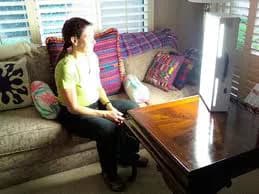What is Light Therapy?
Light Therapy (or phototherapy) emits light that mimics sunlight in the hopes of changing the brain chemistry so as to ease seasonal affective disorder (SAD), a form of depression that is linked to a particular season each year (Example, winter). Its salubrious effect has been observed in a number of other disorders such as non-seasonal depression, insomnia, jet lag, adjusting to nighttime work shift, dementia, etc.
History of Light Therapy:
In places like ancient Egypt, Greece, and Rome around 1400BC, the healing effects (mostly anecdotal) of sunlight were noted for various diseases. This form of therapy was called heliotherapy.
Around the second half of the 19th century, people became interested in heliotherapy and a number of observations were made in research. The important observations during this time period were:
- 1877: Sunlight was reported to kill anthrax bacilli
- 1893: Sunlight was used to treat Lupus vulgaris (skin lesions caused by Mycobacterium tuberculosis, the bacterium that causes tuberculosis. Lupus vulgaris is also known as tuberculosis of the skin)
By the end of the century, researchers realized that the UV rays from the sun were important for heliotherapy’s therapeutic effects. With this knowledge, phototherapy was developed and became an alternative for heliotherapy.
- 1894: the first documented use of artificial light as a treatment for skin disease.
Further investigation of phototherapy occurred throughout the 20th century.
How does Light Therapy work?
In the treatment of SAD
- Treatment typically begins in early fall and ends in spring when there is sufficient sunlight to boost energy and mood. It is most effective when the light indirectly enters the eyes.
- Improvements can be seen in as little as two days or up to several weeks. However, sunlight is reported to ease the symptoms, not cure the disorder.
Treatment of Skin disorders
- Uses UVB (type B ultraviolet), an artificial UV light
- The UVB rays are the causative agent of sunburn; however, when properly controlled, it is reported that they could be used to heal multiple types of skin conditions (Example: psoriasis, eczema)
- These skin conditions contain overactive immune cells (the body’s natural defense against pathogens). UVB acts to shut down the immune cells, thus improving the condition.
The risks of Light Therapy:
The success of the therapy relies on three main elements: duration, timing and sensitivity. It is therefore important to first discuss this therapy with a physician. It is essential to be consistent and not to overdo the therapy for there are some risks:
In the case of SAD treatment
- Eye strain
- Headache
- Nausea
- Irritability/agitation
- Mania, euphoria, hyperactivity, and agitation (observed in some bipolar patients using this as an alternative therapy)
In the case of skin treatment
- Premature skin aging
- Increased risk of cancer
- Mild sunburn (thus it is important to wear sunscreen)
- Developing a tan
- Increased itching and worsening of symptoms (observed in some cases)
Guidelines are in place to reduce the risks; however, it is imperative to discuss the therapy and any symptoms with a licensed physician.
Scientific evidence:
Research on SAD:
A meta-analysis of about 20 different randomized, controlled trials of light therapy for mood disorders reported the following:
- A significant reduction in depression symptoms was observed in eight studies
- Five studies showed a positive impact of light therapy on SAD
- There were improvements recorded for non-seasonal depression in three studies
There is strong evidence that phototherapy can improve the symptoms (not cure) multiple mood disorders.
Research on skin disorders:
- There are a wide range of skin conditions that have been seen to benefit from this therapy
- Even as far back as late 19th and early 20th century, phototherapy was seen to improve skin conditions such as Lupus vulgaris
- Current research has demonstrated that such conditions as psoriasis could, in fact, benefit from phototherapy
- Multiple studies have shown the positive effects of phototherapy and many dermatologists provide an option of phototherapy to treat a variety of skin diseases
A word of caution:
Light therapy boxes are available in a wide range of stores and it is important to be familiar with the features and options. Please consult with your healthcare provider before initiating alternative therapies. Tell your healthcare provider about any complementary and alternative practices you use. Give them a full picture of what you do to manage your health. This will help your healthcare provider assess your clinical situation better. This will also help them take appropriate clinical measures to assist you. Full disclosure to your healthcare provider will help ensure coordinated and safe care.
Written by Monique Richards
References:
Roelandts, R. (2002). The history of phototherapy: Something new under the sun? Journal of the American Academy of Dermatology, 46(6), 926-930.
DermNet NZ. (n.d.). Retrieved February 19, 2016, from http://www.dermnetnz.org/bacterial/tuberculosis.html
Light therapy. (n.d.). Retrieved February 19, 2016, from http://www.mayoclinic.org/tests-procedures/light-therapy/basics/results/prc-20009617
Psoriasis Vulgaris of Vulva. (n.d.). Retrieved February 19, 2016, from http://www.dovemed.com/diseases-conditions/psoriasis-vulgaris-vulva/
Golden, R. N., Gaynes, B. N., Ekstrom, R. D., Hamer, R. M., Jacobsen, F. M., Suppes, T., . . . Nemeroff, C. B. (2005). The Efficacy of Light Therapy in the Treatment of Mood Disorders: A Review and Meta-Analysis of the Evidence. American Journal of Psychiatry AJP, 162(4), 656-662.
Phototherapy: UVB - American Osteopathic College of Dermatology (AOCD). (n.d.). Retrieved February 19, 2016, from http://www.aocd.org/?page=PhototherapyUVB
Phototherapy. (n.d.). Retrieved February 19, 2016, from https://www.psoriasis.org/about-psoriasis/treatments/phototherapy
Related Articles
Test Your Knowledge
Asked by users
Related Centers
Related Specialties
Related Physicians
Related Procedures
Related Resources
Join DoveHubs
and connect with fellow professionals


0 Comments
Please log in to post a comment.